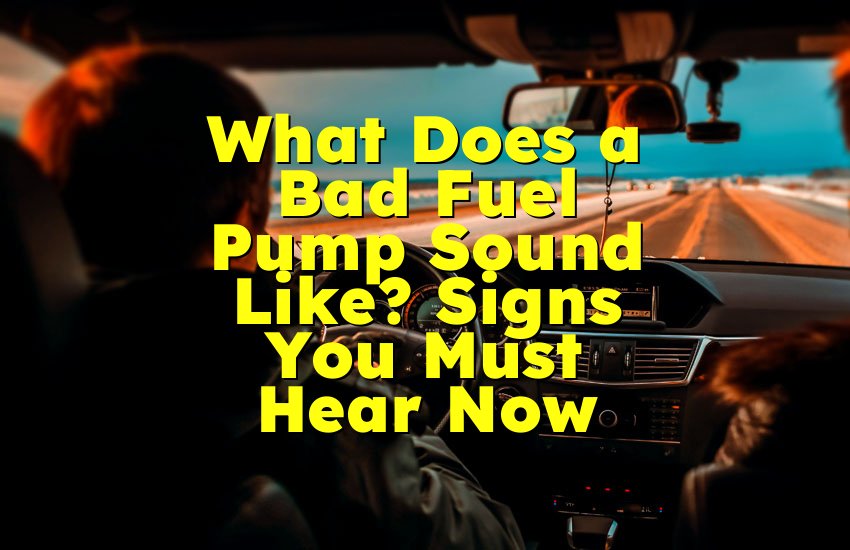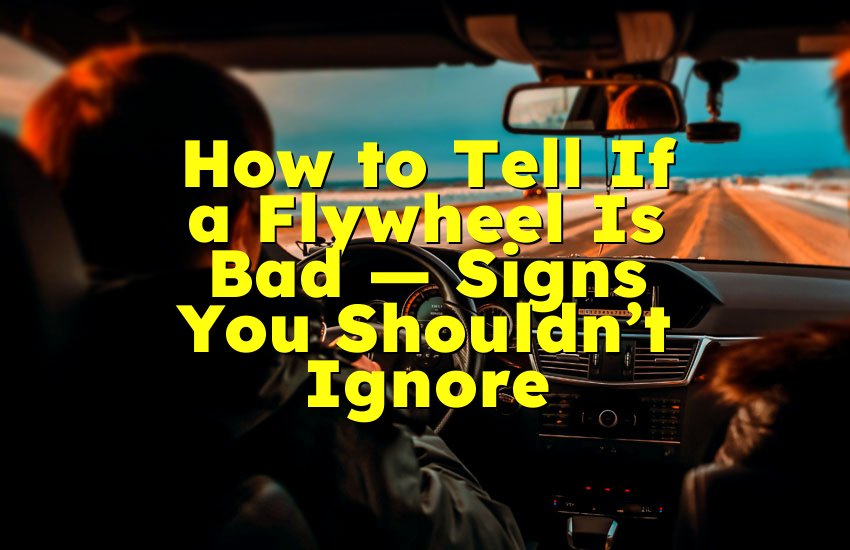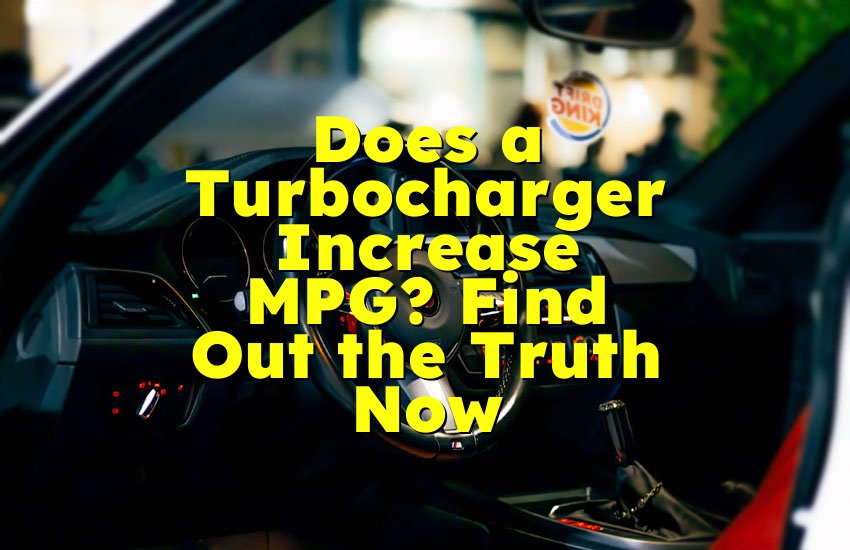As an Amazon Associate, I earn from qualifying purchases at no extra cost to you.
What Does a Bad Fuel Pump Sound Like? Signs You Must Hear
If your car feels weak or struggles to start, your fuel pump might be failing. A bad fuel pump often makes a whining or humming sound. In this article, we explain how to hear it clearly, what the sounds mean, and how to know if your fuel pump needs urgent attention. By listening carefully, you can save money and avoid getting stranded.
Listen for Whining or Humming Noises from the Tank
A bad fuel pump often makes a high-pitched whining or humming sound. Usually, this comes from the rear of the car where the fuel tank is. The sound can get louder when the car is on, especially when the engine is starting. If you hear this, it means the pump is struggling to move fuel properly.
Sometimes, the humming comes and goes. It may be faint at first, then become louder over time. This is a common sign that the pump is wearing out. Driving with a weak fuel pump can cause more serious engine problems if ignored.
Pay close attention when starting your car in the morning. Cold starts can make the noise more noticeable. Also, check the noise when the car is idle. If the sound changes when you rev the engine, it could indicate a failing pump.
Try comparing your car with another of the same model. You can often notice if your fuel pump sounds different. If you are unsure, a mechanic can help. They can listen and test the fuel pressure to confirm the problem.
- Whining or humming noise from fuel tank
- Noise gets louder over time
- More noticeable on cold starts
- Changes when engine revs
Check for Engine Sputtering or Stalling
When a fuel pump fails, it often causes the engine to sputter. This happens because fuel flow is inconsistent. The car may hesitate when you press the accelerator. Sometimes it feels like the engine is choking for fuel.
Stalling is another common sign. Your car may suddenly stop while driving or idling. This is dangerous and can happen in traffic. If your fuel pump is failing, the engine cannot get the fuel it needs to run smoothly.
Notice if the problem happens more at higher speeds or under heavy load. A weak fuel pump may not supply enough fuel when the engine is pushed. You may also see misfires or rough idling.
Early detection is important. Ignoring sputtering or stalling can damage other parts of your car. Fuel system repairs are easier and cheaper if you catch the problem early.
- Engine sputters under acceleration
- Car stalls unexpectedly
- Rough idling or misfires
- Problems worsen under heavy load
Listen for Clicking or Ticking Sounds
A failing fuel pump can also make clicking or ticking noises. This is usually heard near the fuel tank or under the rear seat. The sound comes from the pump motor struggling. Often, it is rhythmic and repeats regularly.
This clicking can be louder when the fuel tank is low. Pumps have to work harder to pull fuel from a near-empty tank. Over time, this can wear out the pump faster. Paying attention to the timing and pitch of the clicks helps identify the issue.
Sometimes, the clicking is subtle and easy to miss. You may need to have someone listen while you turn the key on and off. The sound should be compared with normal operation. A professional can also test voltage and pressure for confirmation.
Ignoring the noise may lead to total pump failure. If the pump stops completely, the engine won't start. Replacing the pump at the first sign of clicking is safer than waiting for a breakdown.
- Clicking or ticking near fuel tank
- Sound is rhythmic
- Louder when fuel is low
- Pump may fail completely if ignored

Notice Decreased Fuel Efficiency
A bad fuel pump can lower fuel efficiency. If the pump cannot deliver fuel properly, the engine burns more fuel to perform the same work. You may notice your fuel gauge dropping faster than usual.
Fuel inefficiency may appear gradually. At first, it can be small and easy to miss. Over weeks, it becomes more noticeable. Tracking mileage regularly helps detect this early. Also, watch for sudden increases in fuel consumption after refueling.
Sometimes, other engine issues can cause poor fuel economy. But if paired with noises or stalling, the fuel pump is likely the cause. Addressing the pump problem can restore efficiency and reduce your fuel cost.
Ignoring this sign wastes money over time. Replacing a weak pump improves performance and fuel savings. Mechanics often check fuel pressure as part of the diagnosis.
- Engine uses more fuel than usual
- Gradual or sudden drop in efficiency
- Often paired with noise or stalling
- Fixing pump restores fuel economy
Feel the Car Hesitate on Acceleration
A failing fuel pump often causes hesitation when you press the gas. The car may jerk or feel weak as it struggles to get fuel. This is most noticeable when merging onto highways or overtaking.
Acceleration hesitation can be dangerous, especially in traffic. The engine may surge suddenly when fuel delivery catches up. This is unpredictable and can make driving stressful. Recognizing this early reduces risks.
The hesitation can occur even at low speeds. Driving uphill or carrying extra weight can make it worse. A fuel pressure test usually confirms the pump is weak. Regular maintenance may prevent sudden acceleration problems.
Some cars show multiple signs together. Hesitation often comes with sputtering or engine noises. Addressing it promptly keeps your car reliable and safer to drive.
- Car jerks or hesitates on acceleration
- Worse under load or uphill
- Can be paired with engine sputtering
- Fuel pressure test confirms weakness
Smell or See Fuel Leaks
A failing fuel pump may leak fuel. This is dangerous and often noticed as a strong fuel smell. Sometimes you may see wet spots under the car near the tank. Leaks indicate damaged seals or a cracked pump.
Fuel leaks increase fire risk. Never ignore this sign. Even a small leak can be dangerous if exposed to heat or sparks. Immediate attention is necessary to prevent accidents.
Leaks often appear with other symptoms. You may hear whining, notice stalling, or experience hesitation. Inspect the tank, fuel lines, and pump carefully. Replacement or repair is usually needed.
Regular visual checks can catch leaks early. Always keep the area around the tank clean. Using professional help ensures the leak is fixed safely and completely.
- Strong fuel smell or visible leak
- Usually near fuel tank
- Can appear with other symptoms
- Immediate repair needed
Watch for Engine Warning Lights
Modern cars have sensors that monitor fuel delivery. A failing fuel pump can trigger warning lights on the dashboard. Common lights include the check engine light or fuel system alert.
These lights indicate something is wrong with fuel pressure or delivery. Ignoring them can cause bigger engine problems. Mechanics can read error codes to identify the exact cause.
Sometimes, lights appear intermittently. This may happen when the pump struggles under certain conditions. Regular monitoring and attention prevent unexpected breakdowns.
Dashboard warnings often accompany other signs. If you hear noises, notice stalling, or see leaks, the lights confirm the pump is failing. Prompt action avoids costly repairs and keeps driving safe.
- Check engine or fuel warning lights
- Light may come on intermittently
- Confirms fuel pump problems
- Early attention prevents bigger issues
Final Thoughts
Listening carefully to your car helps catch fuel pump problems early. Whining, sputtering, hesitation, and leaks are key signs. Acting quickly saves money and keeps you safe. Regular checks and maintenance improve performance. Pay attention to unusual sounds and behavior to avoid sudden failures. Your car will thank you with smoother rides and fewer surprises.
| Symptom | What It Means | Action Needed |
|---|---|---|
| Whining/Humming | Pump struggling | Check and replace if needed |
| Engine Sputtering | Inconsistent fuel | Inspect fuel pump |
| Clicking/Ticking | Pump motor failing | Test fuel pressure |
| Poor Fuel Efficiency | Weak pump | Repair or replace pump |
| Hesitation on Acceleration | Fuel delivery low | Check pump |
| Fuel Leaks | Damaged pump/seals | Immediate repair |
| Dashboard Warning Lights | Fuel issue detected | Diagnose and fix |
Frequently Asked Questions (FAQs)
Is it normal for a fuel pump to make noise?
No, a normal fuel pump is mostly quiet. Some sound is expected on startup, but constant whining, humming, or clicking is not normal. Noise usually means the pump is under stress or failing. Over time, ignoring these sounds can lead to stalling or engine damage. Always monitor the car and get professional help if unusual sounds persist.
Can a bad fuel pump cause my car not to start?
Yes, a weak or failing fuel pump may prevent the engine from starting. If fuel does not reach the engine, it cannot ignite. You may hear the pump trying to work but the car won’t turn over. Catching the problem early avoids being stranded. A mechanic can test fuel pressure and replace the pump if necessary.
Do I hear whining only when the pump is bad?
Not always, but persistent whining is a strong sign. Some new cars make a soft sound during startup, but it usually stops quickly. Continuous or growing whining, especially from the fuel tank, signals wear. Comparing with a normal vehicle helps identify the issue.
Is it dangerous to drive with a failing fuel pump?
Yes, it can be dangerous. Stalling, hesitation, or fuel leaks increase accident risk. Driving with a weak pump can also damage the engine over time. Immediate repair is safer and prevents further problems. Safety should always come first when fuel delivery is compromised.
Can a fuel pump fail suddenly?
Yes, pumps can fail without warning. Gradual wear often gives signs, but complete failure can occur unexpectedly. Cold starts, low fuel levels, or high engine load may trigger sudden failure. Regular checks and attention to noises reduce the risk of a surprise breakdown.
Do I need to replace the fuel pump if efficiency drops?
Often, yes. Lower fuel efficiency with other symptoms usually points to a weak pump. Mechanics may confirm this with pressure tests. Replacing the pump restores fuel delivery, improves mileage, and prevents engine damage.
Is a fuel smell always from the pump?
Not always, but it is a common cause. Fuel leaks may come from the tank, lines, or pump seals. If the smell appears with other signs like noise or stalling, the pump is likely the source. Immediate inspection is critical to prevent fire risk.
Can I drive a short distance with a bad fuel pump?
It is risky. Short trips may be possible if the pump works intermittently, but the car can stall anytime. Hesitation, stalling, or sudden stops increase danger. Fixing or replacing the pump is the safest choice to prevent accidents and further damage.











